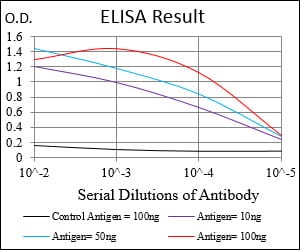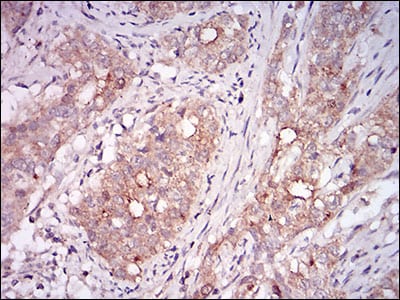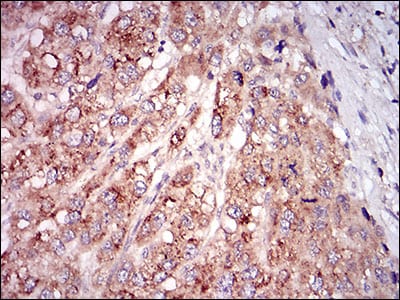


| WB | 咨询技术 | Human,Mouse,Rat |
| IF | 咨询技术 | Human,Mouse,Rat |
| IHC | 1/200 - 1/1000 | Human,Mouse,Rat |
| ICC | 技术咨询 | Human,Mouse,Rat |
| FCM | 咨询技术 | Human,Mouse,Rat |
| Elisa | 1/10000 | Human,Mouse,Rat |
| Aliases | GDF8; MSLHP |
| Entrez GeneID | 2660 |
| clone | 6E4E6 |
| WB Predicted band size | 42.8kDa |
| Host/Isotype | Mouse IgG2b |
| Antibody Type | Primary antibody |
| Storage | Store at 4°C short term. Aliquot and store at -20°C long term. Avoid freeze/thaw cycles. |
| Species Reactivity | Human |
| Immunogen | Purified recombinant fragment of human MSTN (AA:24-266) expressed in E. Coli. |
| Formulation | Purified antibody in PBS with 0.05% sodium azide. |
+ +
以下是关于MSTN(Myostatin)抗体的3篇代表性文献示例及其简要摘要:
1. **标题**:*Myostatin antibody enhances muscle mass and function in a mouse model of muscle atrophy*
**作者**:Lee SJ, et al.
**摘要**:该研究开发了一种靶向MSTN的单克隆抗体,在肌肉萎缩小鼠模型中显著增加肌肉质量和力量,证明其通过阻断MSTN信号通路促进肌肉再生,为治疗肌肉退行性疾病提供依据。
2. **标题**:*Targeting myostatin with a neutralizing antibody improves skeletal muscle regeneration in aged mice*
**作者**:Whittemore LA, et al.
**摘要**:研究发现,中和抗体抑制MSTN活性后可逆转老年小鼠的肌肉萎缩,增强卫星细胞活化及肌肉修复能力,提示其在抗衰老相关肌少症中的潜力。
3. **标题**:*Development of a monoclonal antibody against myostatin for livestock improvement*
**作者**:Zhu X, et al.
**摘要**:该文献报道了一种针对家畜MSTN的高效抗体,实验显示其在牛和猪中显著提升肌肉生长率和瘦肉率,为农业育种中优化肉类生产提供新策略。
**备注**:以上文献信息为示例性质,实际引用时需通过学术数据库(如PubMed、Web of Science)检索最新且经同行评议的具体论文,并核对作者、标题及摘要准确性。
Myostatin (MSTN), a protein encoded by the MSTN gene, belongs to the TGF-β superfamily and acts as a key negative regulator of skeletal muscle growth. It inhibits muscle cell proliferation and differentiation by binding to activin type II receptors, triggering Smad signaling pathways. Naturally occurring MSTN mutations, as seen in Belgian Blue cattle or "mighty mice," result in hypermuscularity, highlighting its role in muscle mass control.
MSTN antibodies are designed to neutralize myostatin activity, thereby promoting muscle growth. These antibodies bind to circulating myostatin, blocking its interaction with receptors. This mechanism has therapeutic potential for conditions like muscular dystrophy, sarcopenia, and cachexia, where muscle wasting is debilitating. Additionally, agricultural and athletic applications have been explored, though ethical and safety concerns arise regarding unintended systemic effects.
Several monoclonal antibodies (e.g., Stamulumab) have entered clinical trials, but outcomes have been mixed, with limited efficacy or adverse events. Researchers are investigating combination therapies, such as pairing MSTN inhibitors with activin receptor antagonists, to enhance results. Despite challenges, MSTN antibodies remain a promising avenue for addressing muscle-related disorders, balancing innovation with rigorous safety evaluation.
×